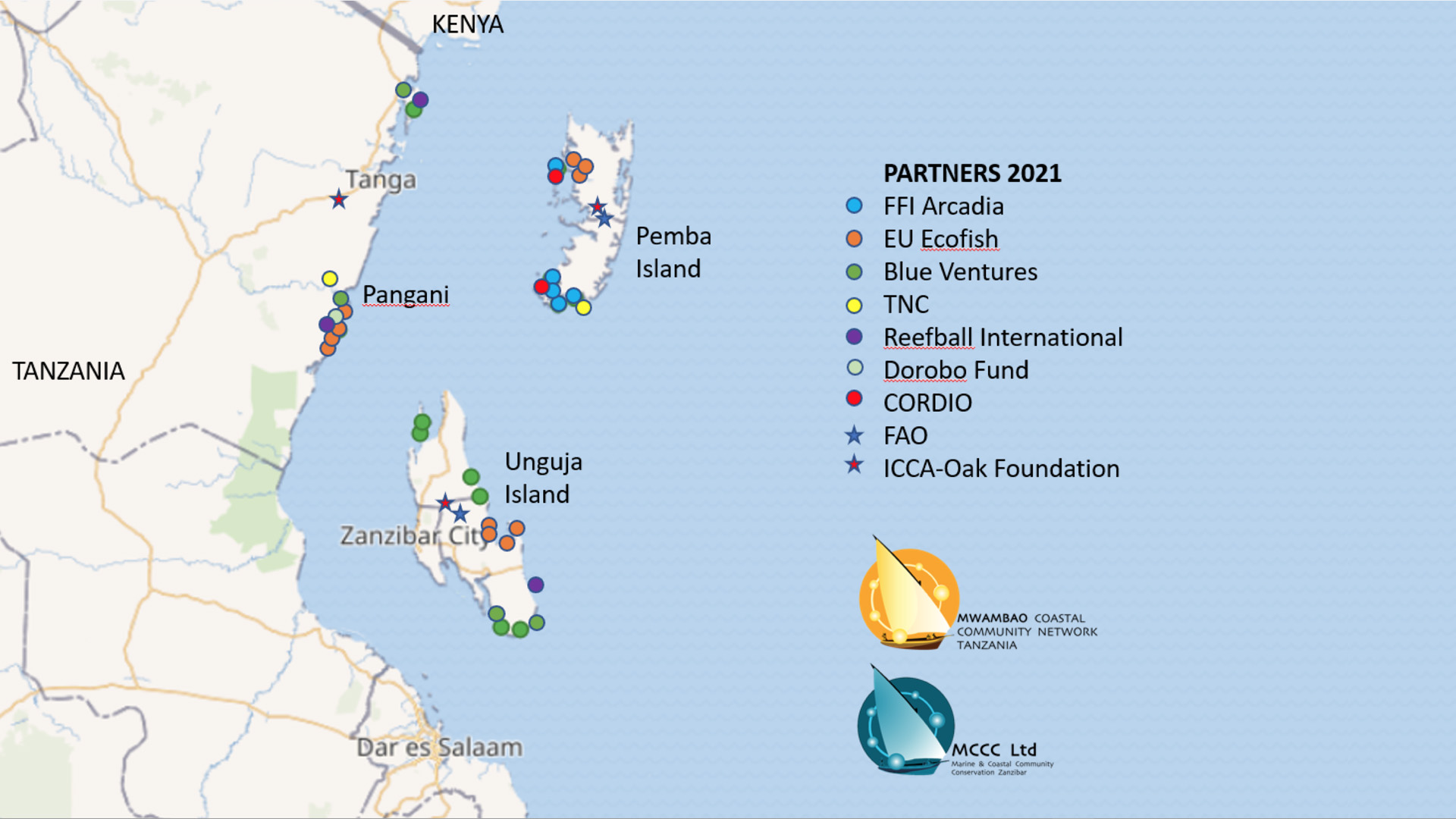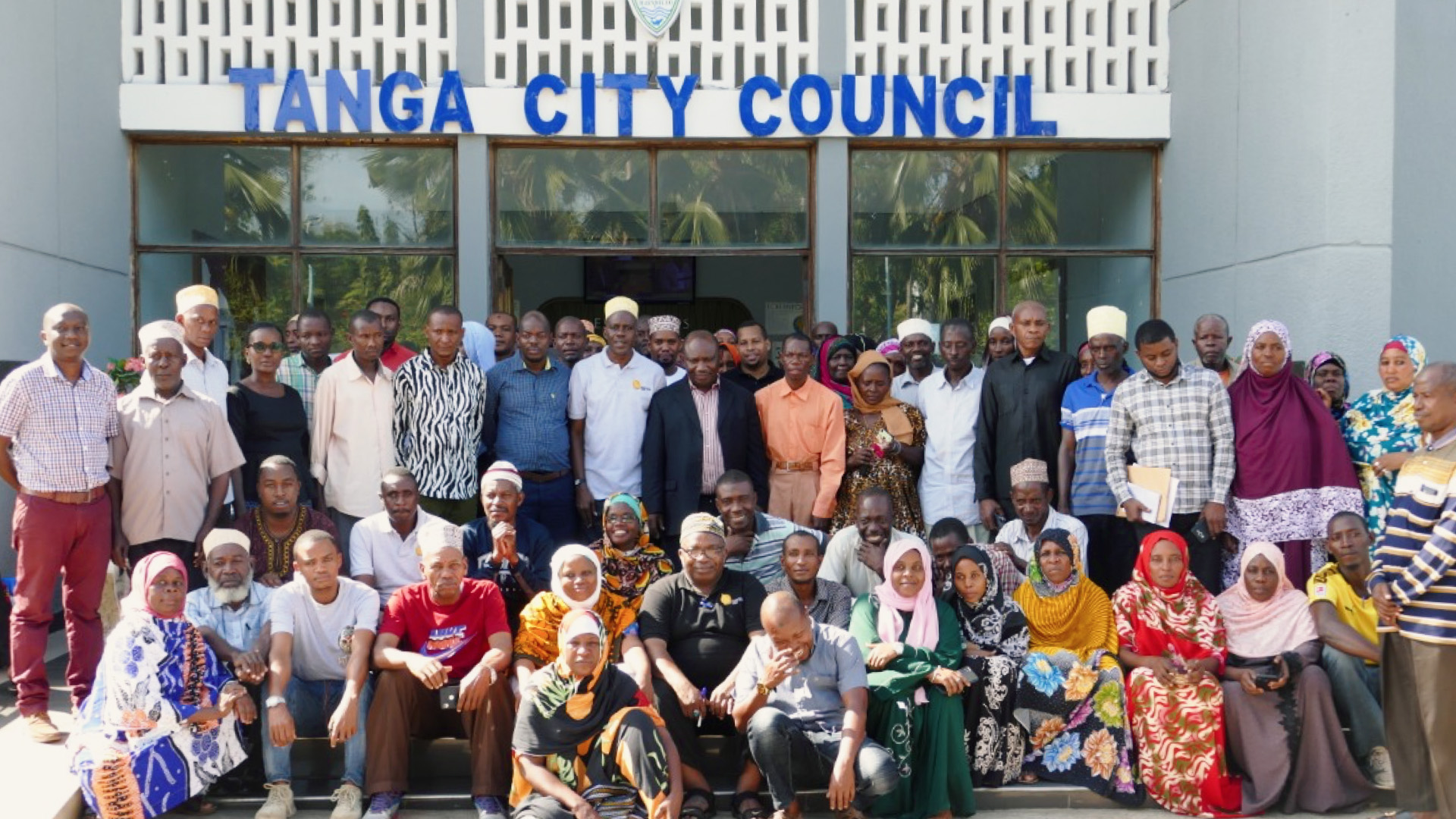Mwambao Coastal Community Network (ICCA Consortium Member) reports from the last annual network meeting and share lessons learned about community-led coastal and marine governance in Zanzibar islands and north-eastern Tanzania
First published on 03/29/2022, and last updated on 06/18/2025
By Ali Thani
Chief Executive Officer, Mwambao Coastal Community Network (ICCA Consortium Member)
Over the last decade, Mwambao (ICCA Consortium Member) and MCCC have emerged as leading actors in facilitating community-led coastal and marine governance in Zanzibar and north-eastern Tanzania. Working with key national and international partners, Mwambao has successfully piloted and expanded new approaches to community-led conservation governance in Ungujam, Pemba, and Tanga islands and Tanzania Mainland. The use of temporary octopus fishery closures and local fisheries closures or no-take zones have been the central components and entry points of the interventions and the success of its work. Communities prepare management plans, including local by-laws and conservation management plans to bolster fisheries in these areas.
Initially, project-level achievements have enabled Mwambao to grow from a start-up stage to a significantly expanded organization; we now have more staff, new resources, and growing impacts. We also have meaningful partnerships with national and international organizations that are helping us to play a lead role in coastal and marine conservation governance. Strong relationships with communities and the government in Zanzibar also provide essential foundations for our future growth.

This year was a very successful year to revive our Networking activities, which slowed down for a while. Mwambao received grant support from the ICCA Consortium to continue strengthening our network in Tanzania, enabling us to undertake an annual network meeting. We invited 53 (31 male and 22 female) members of different professions from Tanga and Zanzibar and other coastal areas. The invited members include men and women fish-workers, seaweed farmers, conservation eco credit members, VSL members, and community representatives who participated in habitat restoration, and BMU and SFC leaders.
The meeting aimed to share good practices related to co-management and livelihood development initiatives, their success, challenges, and plan for ways forward to address and adapt to the change. The event also enabled the participants to participate in a field study visit to Ushongo village in Pangani district, South of the Tanga Region. The purpose was to learn and share experiences about how the community participated in implementing fisheries management measures, more specifically, reef resilience using temporary reef closures, establishing participatory marketing system development measures, and revenue collection.
Lessons learned from the network meeting and field visit
- Internal stakeholders’ collaboration between Beach Management Units (BMU), Village government, fishers, local government partners, tourist investors, and Mwambao facilitators have made coral reef resilience practice on closure establishment successful initiatives in the Tanga region.
- There is outstanding creativity from Ushongo BMU, specifically in revenue collection in BMU financial sustainability. The participants learned from the village that all fishers need to have a permit and contribute 2,000 Tanzanian Shilling to enter the site during opening or harvesting time. This has created another revenue collection opportunity that would increase the income of BMU to be used for operational and management activities.
- Inviting tourists and other guests to witness led to more contributions to closure opening; tourists and guests are charged 5,000-10,000 [Tanzanian] Shilling for fishing.
- Reducing illegal fishing improved marine biodiversity – this was witnessed in Ushongo and supported by other participants in all areas that practice coral reef resilience through temporary octopus closures. In these areas, the average size of catch is increasing.
- Strong participation of women in marine resources governance was witnessed during the meeting. Most of the women participants raised their voices that fewer women fishers are in the sector. Women anglers are only considered cleaners of shells and shrimps.
- There is an excellent benefit-sharing mechanism in the Pemba and Unguja villages that are practicing octopus closure but need to be improved so that all stakeholders receive benefits; currently, many see only BMU committees are the sole beneficiaries.
- Conservation Eco Credit initiated by Mwambao has motivated communities to participate in marine conservation governance by enforcing compliance measures.
Local voices
We thank and appreciate MWAMBAO for the network meetings as they open our minds to Conservation Eco Credit funds as an incentive for marine conservation. This has increased the number of communities supporting marine environmental protection.
Kassim Mohd, Kukuu village, Pemba
We can learn from each other practically through field visits and sharing experiences on proper resources management, including patrol, co-management issues, record keeping, Participatory Market System Development (PMSD), and benefit-sharing mechanisms.
Said, Fundo village, Pemba
We are pleased that the ecological situation is improving after more than a decade. Increased octopus production in Ushongo made our community happy from the catch and started to attract buyers from outside.
Mungia, Mgaza village, Ushongo
It is not time to wait for the government or donors to support. BMU needs to be very creative to build relations with tourism investors who can provide material and financial support for surveillance.
Said Kigandu, Songosongo Island
About Mwambao
Mwambao Coastal Community Network is a Non- Government Organization established in 2010 to maintain healthy marine ecosystems through improved sustainable coastal resource governance and diversified community livelihoods. The key goals include strengthening local coastal and marine resources governance institutions,increasing benefits from the sustainable use of coastal and marine resources,improving policy and legislation to support community-led management, networking, sharing knowledge, and advocacy for sustainable coastal resources management and livelihoods development. With dual registration (Mwambao in Tanzania mainland and MCCC Ltd in Zanzibar), it works in 33 Zanzibar and Tanzania mainland sites.
